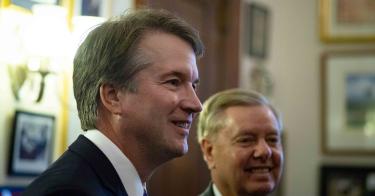Led by Senator Cory Booker (D., N.J.) some on the left are insisting that the Senate defer consideration of Supreme Court nominee Brett Kavanaugh until independent counsel Robert Muller’s investigation is complete.
Booker & Co. have not explained the connection between the Mueller investigation and the Kavanaugh nomination. It’s possible they mean that the Supreme Court may, someday, have to consider a case arising from the investigation. By that “logic,” however, the Senate should not consider Supreme Court nominations because, someday, it might have to consider whether legislation is constitutional. That’s the Supreme Court’s job.
Here’s a precedent that Booker may have overlooked.
In March 1992, during the presidential campaign, the New York Times published an exposé of investments made in the Whitewater Development Corporation by then-Arkansas governor Bill Clinton, his wife Hillary, and their friends James and Susan McDougall. The Resolution Trust Corporation’s investigation into the failure of Madison Guaranty Savings and Loan, owned by the McDougalls, led to examining that failure’s connection to Whitewater.
These investigations were live when President Clinton nominated Ruth Bader Ginsburg to the Supreme Court on June 22, 1993, and when the Senate confirmed the nomination on August 3, 1993. No one said a word about pending investigations affecting the confirmation process.
In January 1994, Attorney General Janet Reno appointed special counsel Robert Fiske to investigate the Whitewater transactions. In May 1994, he issued a grand-jury subpoena to both Bill and Hillary Clinton, demanding documents related to the Madison Guaranty failure.
On May 17, 1994, Clinton nominated Judge Stephen Breyer to replace Justice Harry Blackmun on the Supreme Court. The Judiciary Committee held a hearing on July 12-14, and the full Senate voted 87-9 to approve the nomination on July 26. Again, no one suggested that the confirmation process should be changed in any way to accommodate this investigation.
In other words, Clinton appointed not one, but two, Supreme Court Justices while he was under investigation. The second appointment came while he was actually “under subpoena.” If Democrats care as much about precedent as they pretend, this one blows their Mueller-Kavanaugh argument out of the water.
It’s been only a few days since Kavanaugh’s nomination. If this is the quality of the spaghetti being thrown at the wall, it’s going to be a bumpy ride.
This piece originally appeared in The National Review



